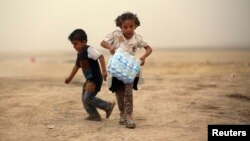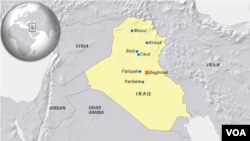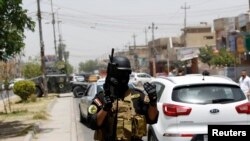GENEVA —
A senior U.N. humanitarian official on Tuesday flagged the risk of a mass exodus of Iraqi refugees from sectarian bloodshed overwhelming nearby countries already reeling from nearly 3 million uprooted Syrians.
Within Iraq, at least 300,000 people fleeing fighting in the northern city of Mosul have sought shelter in its relatively calm, autonomous Kurdistan region in the past week, according to the United Nations refugee agency. Another 500,000 Iraqis have been on the move within the country since sectarian fighting flared in the western Iraqi province of Anbar in January.
“At the present moment, we have a very serious confrontation and we have meaningful levels of internal displacement. We are not yet witnessing a massive refugee outflow and I think it will depend on whether this crisis can be addressed effectively in the near future or whether it will be a protracted conflict,” said U.N. High Commissioner for Refugees Antonio Guterres.
“If it will be a protracted conflict, I think it will be inevitable to have again a meaningful outflow of refugees,” he told a press briefing in Geneva.
Forces of the Islamic State of Iraq and the Levant have made a rapid advance through northern Iraq in the past week, but Baghdad's Shi'ite Muslim rulers defied Western calls on Tuesday to reach out to Sunnis to defuse the crisis.
More than 2.8 million Syrian refugees have registered in neighboring countries, including 225,000 in Iraq, since that country's conflict began in 2011, according to the UNHCR.
“Looking at the situation of the countries of the region, I mean Syria is obviously not a possible destination [for Iraqi refugees], Jordan is now having the enormous pressure of the Syrian refugees,” Guterres said. “So it's difficult to see how the region can cope with another big refugee outflow.”
If there is a mass exodus from Iraq, international solidarity would be absolutely essential, he added.
“Obviously, if that would occur, I would hope that Iraqis could be well received everywhere. But as I said, for the moment the most important is to avoid it,” said Guterres.
Within Iraq, at least 300,000 people fleeing fighting in the northern city of Mosul have sought shelter in its relatively calm, autonomous Kurdistan region in the past week, according to the United Nations refugee agency. Another 500,000 Iraqis have been on the move within the country since sectarian fighting flared in the western Iraqi province of Anbar in January.
“At the present moment, we have a very serious confrontation and we have meaningful levels of internal displacement. We are not yet witnessing a massive refugee outflow and I think it will depend on whether this crisis can be addressed effectively in the near future or whether it will be a protracted conflict,” said U.N. High Commissioner for Refugees Antonio Guterres.
“If it will be a protracted conflict, I think it will be inevitable to have again a meaningful outflow of refugees,” he told a press briefing in Geneva.
Forces of the Islamic State of Iraq and the Levant have made a rapid advance through northern Iraq in the past week, but Baghdad's Shi'ite Muslim rulers defied Western calls on Tuesday to reach out to Sunnis to defuse the crisis.
More than 2.8 million Syrian refugees have registered in neighboring countries, including 225,000 in Iraq, since that country's conflict began in 2011, according to the UNHCR.
“Looking at the situation of the countries of the region, I mean Syria is obviously not a possible destination [for Iraqi refugees], Jordan is now having the enormous pressure of the Syrian refugees,” Guterres said. “So it's difficult to see how the region can cope with another big refugee outflow.”
If there is a mass exodus from Iraq, international solidarity would be absolutely essential, he added.
“Obviously, if that would occur, I would hope that Iraqis could be well received everywhere. But as I said, for the moment the most important is to avoid it,” said Guterres.







